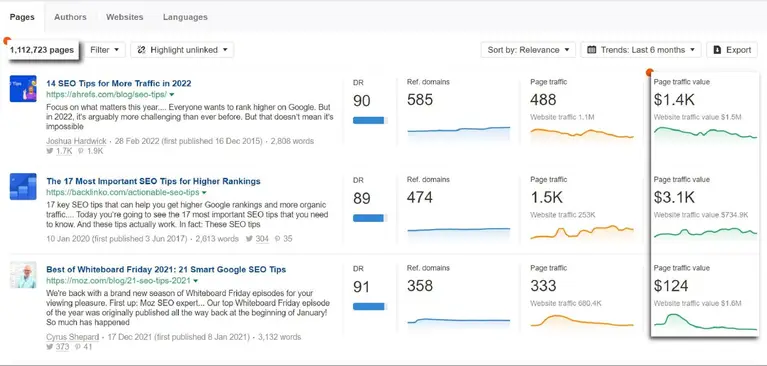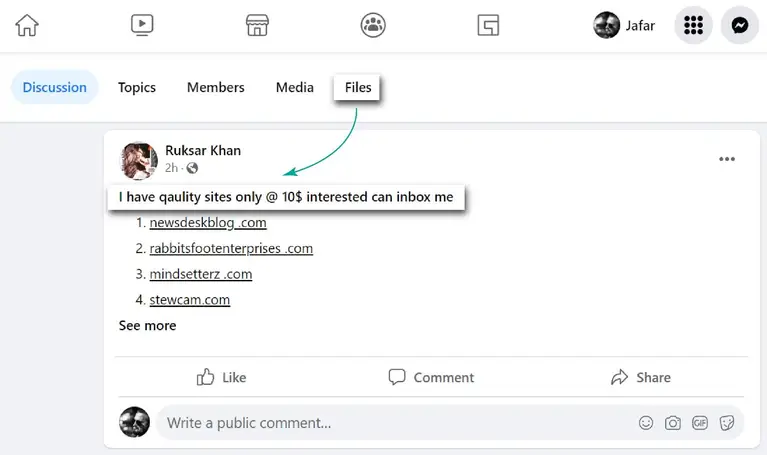
Don't Use These Outdated Off-Page SEO Techniques
Do you know what’s worse than an ineffective off-page SEO technique? A tactic that completely devastates your SEO performance and makes you vulnerable to Google penalties.
And that is the case with old-school off-page SEO strategies. These strategies might simply add no value to your business or can attract penalties.
However, many businesses continue deploying these techniques to build easy links. So, here are 7 old-school off-page SEO techniques that would do you more harm than good.
Avoid these Old School Off-page SEO Techniques
1. Stop Relying Upon Link Directories
Link directories once gave SEO professionals and businesses an easy way to accumulate backlinks.
Previously the link directories also helped searchers to find websites based on their business categories. However, these were when search engines were still building their search algorithms.
The software that powered link directories was easy to install and allured marketers to win abounding links with ease.
Fast forward to the present times, search engine algorithms are optimized to offer superior value to visitors. And they frown upon the low-quality link directories that offer no value to the searchers.
Instead, Google penalizes the businesses that still invest in low-quality link building from link directories.
The takeaway is finding highly niche-specific link directories that follow stringent guidelines.
Moreover, you must start focusing on high-quality content outreach strategies to build valuable links.
You can use the “Content Explorer” tab in Ahrefs to explore the best-performing content ideas in your niche. Start by searching for content ideas relevant to your crucial business keywords. And build high-quality content to promote and share it for backlinks.
The below screenshot shows a wide range of topic suggestions and several sites linking to the topics.

Also, repurpose valuable content such as social media feed posts, images, videos, infographics, etc.
Engage more webmasters with your content and attract natural backlinks.
2. Avoid Reciprocal Link Building
Google considers backlinks a vote of authority from the referring domain to the beneficiary domain.
And so webmasters were happy to jump on the collaborative link-building approach. This approach is better known as reciprocal link building or link exchange.
Take a look at this picture that explains what reciprocal link building is.

The idea of ’a link in exchange for a link’ became highly lucrative for millions of marketers. And this link tradeoff significantly resulted in irrelevant link-building.
So much so, you could easily come across a link-exchange pitch like:
“Your furniture website looks like a valuable place to link to my e-learning website. And, of course, I will be happy to link back to you. Let’s call it a deal!”
Even worse, providers didn’t add these links to relevant content pages but to the resource pages. These pages already have many invaluable links, so one more doesn’t look like a problem.
And so, this technique has already lost its off-page SEO value.
However, if you plan to do link-exchange collaborations, bet on relevancy.
You can use SEMRush or Ubersuggest to find some valuable referring domains that link to your competitors. Consider connecting with these domains and practice highly valuable link exchange deals.
Read: Benefits of Link Building for Local SEO
3. Stop Depositing Huge Chunks of Low-Quality Content to Article Directories
Article directories started as valuable platforms to share your content with a huge audience. Moreover, you gained a backlink from this content submission.
It gained popularity as an easy way to get backlinks. And what followed is millions of irrelevant and low-quality article depositions in the wake of earning links.
Most of the article directories that lacked strict guidelines were blown with low-quality content. The content on these sites is typically created using spun content generator tools.

And these platforms were no longer valuable for readers and searchers.
Marketers started using article spinning tools to make hundreds of low-quality versions and submitting them across the directories.
However, Google soon ended this Black Hat technique with the Panda update in 2011.
The update was a big smash for websites offering bad, spammy, stolen, or crap content.
However, many businesses continue building links through article directories. And this makes them more vulnerable to a Google penalty instead of growing authority.
But, you can still research some niche-specific article directories that follow strict high-quality content guidelines. Meanwhile, check relevant guest blogging opportunities to submit articles and gain links.
Here is a list of top guest blogging sites; Find the most relevant ones and send your pitch.
4. Refuse to Use Irrelevant Guest Blogging
Guest blogging is still a reliable link-building technique, and its roots lie in offering valuable content.
The goal of the traditional guest blogging approach was:
- To find the right exposure for your content
- To build brand credibility and showcase expertise, and
- To earn an authoritative backlink
Moreover, the traditional guest blogging approach added genuine value for consumers. It reflected a perfect harmony of killer content and highly relevant collaborations.
But, considering Google’s enhanced focus on fresh content, webmasters were happy to accept more guest post requests. And this gave marketers a reason to send abounding guest post requests irrespective of relevancy.
As a result, Google was angry to witness completely off-topic content floating across guest blogging sites. The search engine platform also penalized many sites while cleaning this mess.
And so, if you wish to leverage guest blogging, you must adopt the traditional approach:
- Start with searching the most relevant guest blogging sites in terms of audience & niche. The below screenshot shows how to choose the right sites for your guest blogs.

- Use Mention to scrutinize your competitor’s mentions and their guest blogging submissions.
- Create valuable articles and pitch guest blogging contributions to the sorted sites
5. Stop the Exaggeration around Exact-match Anchor Text
Confused as a trend, exact-match anchor texts were a fad that once helped marketers rank easily.
So, marketers started making keyword-rich anchor texts (the clickable text of a link).
E.g., One of your crucial keywords is “WordPress theme development.” Then, you could grow your rankings by simply building as many links as possible using this keyword as anchor text.
It became a simple ’pick and ate’ technique for marketers, and they exploited it without a second thought.
Yes, Google was prompt to detect the unnatural use of keyword-rich anchor texts on backlinks. And the search engine clamped down the SEO value of the sites that over-utilized this technique.
Thus, using an equal share of varying anchor texts is good, as shown in the screenshot below.

However, some webmasters still latch onto keyword-rich anchor texts to lose their efforts in vain.
Instead, you must have a natural link profile without exaggerating keyword-rich anchor texts.
Example:
A natural link profile is more likely to have links on branded keywords, “click here,” author names, long-tail keywords, etc.
6. Say ‘No’ to Paid Link Building
Google has always warned webmasters against buying links. And it is clearly against Google’s webmaster guidelines. The webmasters have to be wary of paid link building offers, as shown below, to build quick links.

However, webmasters continue to buy high-authority links. This technique may help you grow your PageRank factor for the short term, but you become more vulnerable to a penalty.
Google bots regularly track unnatural link buying and selling activities. And it wouldn’t take the search engine very long until they bust a link seller network. A drop in ranking for all the link buyers from this source follows.
A good way to build PageRank-passing links is by creating valuable content resources.
You can use the skyscraper SEO technique. Here you must use SEMrush or Ahrefs to find which articles draw the most backlinks to your competitors.
You need to prepare a superior version of these articles and promote them. As your articles reach relevant webmasters, they will more likely use them as a resource.
E.g., You create an article about an exclusive survey on “most effective restaurant marketing techniques.” These can be a valuable resource for restaurant marketing agencies, and they link out to this resource in their articles.
7. Don’t Fall for Automated Link Building Software
One of the old-school off-page SEO activities is automated link building.
Marketers’ insatiable appetite for easy links led to automated link-building software. And this software violated ethical link-building practices.
They started pushing links across blog comments, link directories, bookmarking sites, guestbooks, etc.
Moreover, they could simply deposit thousands of spun articles into article directories for backlinks.
It was a clear violation of Google’s webmaster guidelines. And these low-quality links do more harm than good for your business.
That said, you cannot automate authoritative link building. And you need to practice the natural, value-added content outreach processes.
One good technique is to earn valuable links through PR outreach.
You can use HARO or ProfNet platforms to seek relevant PR contribution opportunities. Sign up as a source on these platforms to connect with a large number of journalists.

These platforms allow you to find PR professionals working over PR stories in your niche. Start pitching your contribution for relevant stories, and you can earn mentions and links.
Key Takeaways
- Stop drawing links from low-quality link directories and focus on building high-quality content.
- Irrelevant link exchanges do not add any SEO value. You can do competitor research to pitch valuable contributions to their referring domains.
- Stop submitting low-quality syndicated content to article directories. Instead, create top-tier articles to submit to reputed guest blogging sites.
- Follow the traditional guest blogging approach. Find relevant guest blogging platforms through competitor research and pitch your contributions.
- Stop forcing exact match anchor texts and instead build natural anchor text distribution.
- Stop buying paid links and use the skyscraper technique to build superior content and promote it for links.
- Do not employ any automated link-building software. Instead, use HARO or ProfNet for relevant PR contributions and links.
ABOUT THE AUTHOR:
Brice Decker

Brice has been handling marketing projects for more than 12 years and he is providing consulting services on SEO, Social Media and PPC. He has a huge expertise in working at large corporations including Accenture Interactive & PwC Digital Services.
ABOUT THE AUTHOR:
Brice Decker

Brice has been handling marketing projects for more than 12 years and he is providing consulting services on SEO, Social Media and PPC. He has a huge expertise in working at large corporations including Accenture Interactive & PwC Digital Services.
Related Post
How to Rebrand Your Business Without Losing SEO?